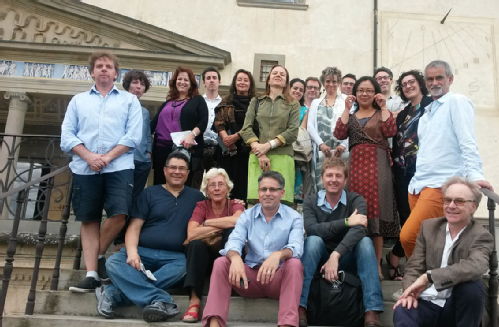The second meeting of the Cultural Economy Network
During the last week of July, the Cultural Economy Network [CEN] held their second meeting – in Monash’s Prato facility in Tuscany, Central Italy. The inaugeral meeting was in Shanghai in November 2013 (see my blog of 2013). The week of the 28th of July began with a symposium called ‘Prato Creative City’, and while not directly connected to CEN, it was co-organised by CEN director Justin O’Connor and featured presentations from a number of CEN members.

The members present at this meeting (which we will hold twice a year) were Helene George (Australia), Anna Carla Fonseca (Brazil), Haili Ma (China/UK), Eric Poettschacher (Germany), Kate Oakley (UK), Tom Fleming (UK), Andy Pratt (UK), Carlos J. Villaseñor Anaya (Mexico), Cornelia Dümcke (Germany), Hans Mommaas (Netherlands), Antoine Guibert (Canada/ Québec), Jordi Pascaul (Spain/Catalonia), Montse Galí (Spain/Catalonia), Christine Merkel (Germany), Avril Joffe (South Africa), Mike Van Graan (South Africa), and with apologies from CEN members not able to be present, Danielle Cliché (UNESCO) and professors Wang Jie and Yin Qinghong (Shanghai).
Our tasks at this meeting were (i) to define ‘cultural economy’ as a field of 'cultural' (not economics) policy critique and find a consensus in the group on our intellectual mission; and (ii) outline a strategy. The meeting is a unique gathering of UNESCO experts, cultural consultants, policy researchers and academics. The breadth of experience in the group is huge, and at times made me feel half my age! And yet, through the extraordinary diversity emerged a palpable sense of community, and as we all aired our various viewpoints, we all agreed that a new voice is needed for a critical approach to global issues in cultural policy and creative industries. We will soon be publishing a website, through which a lot of both individual and collective activities will be posted, along with emerging research and publication plans.
The research questions that will be driving our debates and projects will probably revolve around issues like (i) the construction of the concept of 'economy' and its appropriation in cultural discourse; (ii) the discourse of creative economy and its appropriation by agencies and governments around the world; (iii) the ways in which 'creativity' policy discourse has mis-identified and suppressed 'culture' and its social potential; (iv) the stalled advocacy of 'culture' in global policy frameworks, such as the UN's post-2015 Agenda; (v) the significance of the particular cultural projects, artistic interventions, development NGO and city-based urban innovations (the CEN members are involved in) for generating intellectual content for a recharged critical cultural policy discourse. Can we 'shape' the political imaginary around culture, and how? Where?
 Jonathan Vickery
Jonathan Vickery


 Loading…
Loading…
Comment awaiting approval
This comment is awaiting approval by the author of the entry.
04 Sep 2014, 19:39
Add a comment
You are not allowed to comment on this entry as it has restricted commenting permissions.